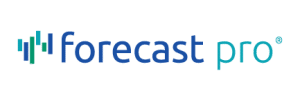Workshop Overview
This workshop surveys the most commonly used business forecasting methods, explains how they work conceptually, discusses their pros and cons, and demonstrates best practices for implementing them in a real-world environment using Forecast Pro. You will leave with insight into all aspects of business forecasting and a working knowledge of proven forecasting methods.
During the hands-on workshop sessions, you will have the opportunity to solve your forecasting challenges by applying what you have learned using state-of-the-art software under the guidance of expert instructors.


The workshop will have various sessions on important forecasting topics:
- Introduction to Forecasting
- Components of Data
- Time series methods including Exponential Smoothing, Box-Jenkins and the Croston’s intermittent demand model
- Advanced techniques including event modeling, top-down reconciliation, dynamic regression, and machine learning
- New Product Forecasting methods
- Forecast Accuracy and Evaluation
- Large scale & multiple-level forecasting
- Identifying Problems in Your Forecasting Process
Who should attend?
This workshop is valuable for anyone whose job responsibilities include preparing or analyzing forecasts—some prior knowledge of statistics is helpful but not essential. The tutorials use Forecast Pro and real-world data to provide a deeper understanding of the forecasting methods and to show best practices; these lessons are applicable regardless of which forecasting software your organization uses.
The workshop also provides a great opportunity to network with your peers to discover how they’ve solved problems similar to your own and to compare notes on forecasting practices. You will be able to make valuable connections with other forecasters during breaks, lunches and at Monday evening’s cocktail reception.
Monday, Oct. 14: 9 am – 5 pm
| Introduction to Forecasting |
| Components of Data |
| Exponential Smoothing |
| Forecast Accuracy and Evaluation |
| Workshop 1 |
| Evening Cocktail Reception |
Tuesday, Oct. 15: 9 am – 5 pm
| Box Jenkins (ARIMA) Models |
| Event-Index Models |
| Large-Scale Forecasting |
| Multiple-Level Forecasting |
| Workshop 2 |
Wednesday, Oct. 16: 9 am – 3:30 pm
| New Product Forecasting |
| Dynamic Regression |
| Forecasting With Machine Learning |
| Workshop 3 |
Monday, October 14
Introduction to Forecasting
A broad overview of business forecasting and its various uses within the organization. Topics include approaches to forecasting, features of data, the role of judgment, selection of appropriate forecasting methods for varied data sets and resources for forecasters.
Components of Data
An in-depth look at the different components found in time series data including trends, seasonal patterns, business cycles, trading-day variations, interventions (events) and noise. Discussion includes the forms the components can take, spotting local vs. global components, interpretation of business cycle indicators and the use of decomposition routines.
Exponential Smoothing
A survey of exponential smoothing techniques with particular emphasis on the Holt-Winters family of models and Croston’s intermittent demand model. Topics include the pros and cons of using these models, when they are best used, how they work, identifying model components, parameter optimization and model diagnosis.
Forecast Accuracy and Evaluation
A detailed look at evaluating the accuracy of forecasting methods. Topics include the distinction between within sample and out-of-sample errors, a survey of error measurement statistics, a summary of findings from forecasting competitions, and an explanation of how to use both real-time tracking reports and simulations as predictors of model performance.
Workshop 1
This first hands-on session familiarizes attendees with the use of the Forecast Pro software package as they are guided through sample exercises applying the ideas discussed during the lectures.
Evening Cocktail Reception
A cocktail reception will be held on Monday evening, providing the opportunity to socialize and network after the first day of the workshop. Connect with other attendees and enjoy a drink while enjoying the historic charm of the Courtyard Boston Downtown.
Tuesday, October 15
Box Jenkins (ARIMA) Models
An exploration into the use of ARIMA models for business forecasting. Topics include the advantages/disadvantages of using these models, how and when they should be applied, automatic identification procedures and model diagnostics.
Event-Index Models
Event-index models extend the functionality of exponential smoothing models by providing adjustments for promotions, strikes and other non-calendar based events. This session addresses how these models work, how and when they should be used, and how to customize their design to best suit your needs.
Large-Scale Forecasting
Approaches for focusing on critical items when forecasting large volumes of data. Topics include evaluating and forecasting SKU data, filtering and ABC (Pareto) classification, outlier detection and correction, exception reporting and measuring accuracy across multiple time series.
Multiple-Level Forecasting
This session explores hierarchical forecasting techniques. Topics include the need for forecasting at various levels, product vs. geographical hierarchies, reconciliation strategies, top-down vs. bottom-up approaches, the use of proportional allocation and adjustment for seasonality.
Workshop 2
In this session, attendees are guided through forecasting exercises and have time to work with their own data with the help of the instructors
Wednesday, October 16
New Product Forecasting
This session explores various approaches for forecasting new products. Topics include the pros and cons of different methods based on a product’s classification and a review of popular methods including item supersession, forecast by analogy and the Bass diffusion model.
Dynamic Regression
A detailed look into the ins and outs of regression forecasting. Topics include when regression models are best applied, how to build the models, ordinary least squares, leading indicators, lagged variables, Cochrane-Orcutt models, hypothesis testing and the use of “dummy” variables
Forecasting With Machine Learning
Machine Learning and AI have emerged as transformational methodologies with a multitude of applications—facial recognition, medical diagnosing and self-driving cars—to name but a few. But can Machine Learning be used to improve your forecasting? Recent forecasting research suggests that it can. This session will discuss the basics and benefits of automated Extreme Gradient Boosting (XG Boost) an effective and accurate Machine Learning algorithm recently implemented in Forecast Pro.
Workshop 3
This final session consists of a regression example after which attendees have time to work with their own data.
Venue & Accommodations

The workshop will be held at the beautiful historic Courtyard Boston Downtown, located in the heart of downtown just minutes from Boston Common. Attendees can reserve rooms at the hotel at the discounted rate of $299 per night until September 23, 2024. Reservations can be made online by clicking here or via phone by calling (617) 426-1400.
Courtyard Boston Downtown
275 Tremont Street
Boston, MA 02116
(617) 426-1400
Workshop Hours
Monday, October 14: 9 am – 5 pm
Tuesday, October 15: 9 am – 5 pm
Wednesday, October 16: 9 am – 3:30 pm
Lunch (including a vegetarian option) will be provided daily for attendees.
A cocktail reception will be held on Monday evening, providing a relaxing environment for socializing and networking after the first day of the workshop.
Registration
Registration Fee: The registration fee is $1,950 USD per attendee. A Team Discount price of $1,550 per attendee is available to organizations registering 3 or more attendees.
Class Size: Due to the interactive nature of the live presentations, attendance is limited and attendees will be registered on a first-come-first-served basis. These workshops typically sell out, so register now to secure your spot!
Cancellation Policy: The workshop is limited in size and we ask that if you must cancel to please inform us as soon as possible. Attendees may receive a full refund if cancellation is made 14 days or more prior to the start of the workshop. Registrants who fail to attend or cancel less than 14 days before the start date are not entitled to receive a refund. Personnel substitutions may be made at any time.

Workshop Attendees are eligible to receive a discount of up to $750 USD when licensing Forecast Pro Software.
Instructors
Eric Stellwagen
Eric Stellwagen is the co-founder of Business Forecast Systems, Inc. (BFS) and the co-author of the Forecast Pro software product line. With more than 30 years of expertise in the field, he regularly presents workshops and publishes on the topic of business forecasting, and is widely recognized as a leading educator on the subject. Drawing upon his extensive consulting experience helping organizations to address their forecasting challenges, Eric infuses his classes with practical approaches and uses real-world data to illustrate concepts. He has worked with many leading firms including Coca-Cola, Kraft, Merck, Nabisco, Owens-Corning and Verizon and has presented workshops for a variety of organizations including APICS, the International Institute of Forecasters (IIF), the Institute of Business Forecasting (IBF), the Institute for Operations Research and the Management Sciences (INFORMS), and the University of Tennessee. Eric served on the board of directors of the IIF for 12 years and is currently serving on the practitioner advisory board of Foresight: The International Journal of Applied Forecasting.
the co-founder of Business Forecast Systems, Inc. (BFS) and the co-author of the Forecast Pro software product line. With more than 30 years of expertise in the field, he regularly presents workshops and publishes on the topic of business forecasting, and is widely recognized as a leading educator on the subject. Drawing upon his extensive consulting experience helping organizations to address their forecasting challenges, Eric infuses his classes with practical approaches and uses real-world data to illustrate concepts. He has worked with many leading firms including Coca-Cola, Kraft, Merck, Nabisco, Owens-Corning and Verizon and has presented workshops for a variety of organizations including APICS, the International Institute of Forecasters (IIF), the Institute of Business Forecasting (IBF), the Institute for Operations Research and the Management Sciences (INFORMS), and the University of Tennessee. Eric served on the board of directors of the IIF for 12 years and is currently serving on the practitioner advisory board of Foresight: The International Journal of Applied Forecasting.
Franklin Rea
Franklin Rea brings over 15 years of expertise in data analysis, technology, marketing operations, and mathematics to his role at BFS. With a background in the enterprise software sector, Franklin has navigated varied industries such as cyber-security, campaign management, and sales training and enablement. In addition, he has worked as a college-level mathematics instructor. At BFS, Franklin serves as a trainer and solutions consultant, assisting clients in maximizing their utilization of the Forecast Pro software, and providing a problem-solving approach and valuable insights to everyday forecasting questions. Franklin holds an M.S. in Mathematics from Northeastern University and received his undergraduate degree from Dartmouth College.
over 15 years of expertise in data analysis, technology, marketing operations, and mathematics to his role at BFS. With a background in the enterprise software sector, Franklin has navigated varied industries such as cyber-security, campaign management, and sales training and enablement. In addition, he has worked as a college-level mathematics instructor. At BFS, Franklin serves as a trainer and solutions consultant, assisting clients in maximizing their utilization of the Forecast Pro software, and providing a problem-solving approach and valuable insights to everyday forecasting questions. Franklin holds an M.S. in Mathematics from Northeastern University and received his undergraduate degree from Dartmouth College.




